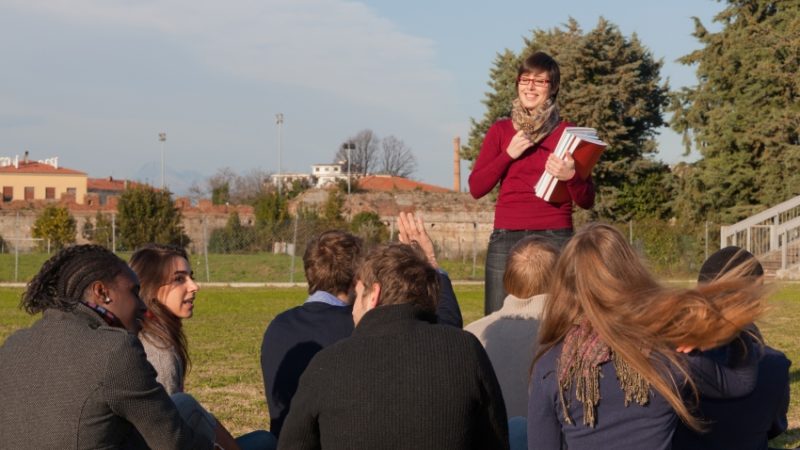Teacher CPD – Take care when organising an ‘expert-led workshop’

Daniel Harvey looks at how to go about obtaining genuinely useful external advice that can help your school progress

I’ve been teaching for over 30 years, and am old enough to remember that moment in the early 80s when noted British actor and screenwriter Colin Welland clasped the Oscar he’d won for Chariots of Fire and chanted, “The British are coming! The British are coming!” The Americans politely applauded.
When staffrooms and subject teams are told ‘The experts are coming!’ – whether to lead on teacher CPD, or INSET or anything else – there tends to be a range of different reactions, emotions and feelings.
My own teaching experience is littered with appalling events which at best, turned out to be a complete waste of everyone’s time. At worst, they resulted in chaotic thinking and vague practices that SLT made otherwise capable educators implement.
“Amazing and inspiring”
Allow me to present three of the very worst expert-led sessions I’ve encountered in my time, which, as Kylie might put it, I just can’t get out of my head.
Let’s start with the external behaviour expert who once presented at our first INSET of the year. This person had been giving what turned out to be the same, identical three-hour presentation on the back of a steady-selling, yet contentious book to a range of primary and secondary schools, all of whom had radically different visions for their behaviour policies and wildly divergent needs.
As you might expect, the tasks presented to our staff thoroughly failed to effectively address the behaviour issues we had in our school. The subsequent staff feedback was not good.
Waste of time
At another INSET day, an external presenter (who in hindsight, was perhaps less of an expert than they had made out) guided us through detailed work that he had researched and prepared for a completely different school to ours. This was right down to highly specific reflections for this other setting, the relevance and importance of which he was evidently trying to bluff.
It was long, slow and ultimately a waste of six hours that we could have spent on real work leading to improved student outcomes and attitudes. The final part was so bad there were loud mutterings from staff, resulting in a tricky end to a difficult day.
Finally, there was the school leader who had previously seen an inspiring presentation from a well-known secondary headteacher. It had apparently been ‘amazing and inspiring’ and would ‘go down really well’ with our staff.
As it turned out, this former headteacher told some funny jokes. He was clearly a seasoned public speaker and told us about some evidently impressive work that he’d been doing at his school.
However, my colleagues ultimately spent four hours listening to a very nice ex-head before all going back to focusing/worrying on the serious issues facing our school. Though we did receive a signed copy of his book.
What to avoid
Middle leaders and school leaders must be alert when choosing an expert speaker to present to staff. I have a friend who describes some educator consultants as ‘surfing the zeitgeist’. They sell their wares (often a book), present the latest ideas and/or recycle others’ thinking and work.
The prominence of certain social media accounts can sometimes blindside school leaders into choosing speakers who, in reality, simply aren’t the people those social media presences make them out to be.
Leaders need to check that a speaker’s grasp and understanding of the relevant research is always solid, rather than tenuous.
The examples outlined above all demonstrate the issues can arise from a fundamental failure to communicate. SLT planned these events without anyone specifying exactly what the outcomes should be, what staff would do and work on, and how we could develop that work into effective practice.
In the worst example, the event took place simply so that time would be occupied. All further failed because school leaders didn’t plan the session in conjunction with the external consultant. The onus for successful school CPD is on leaders to make it work.
What to do
Schools will work hard to produce improvement plans for addressing identified issues and priorities within their existing provision. Any INSET days, teacher CPD sessions or workshops that you plan during the school year ought to focus around these plans and themes. Schools should make sure that the main thing is the main thing.
Moreover, any CPD programmes from external providers that schools turn to should adhere to the principles set out by the likes of the Education Endowment Foundation and Teacher Development Trust.
The articles I’ve linked to in the ‘Further reading’ section below set out some simple, principled methods for teachers and leaders to follow.
To take one example from my own experience, I managed to oversee a successful INSET day and subsequent work by first identifying a potential speaker who was an evident expert in cognitive psychology and the science of learning and memory.
At the time, the importance of knowing about such work had been firmly established. Through effective planning and collaboration, our staff were able to participate in an informative and engaging day that gave them the necessary knowledge, motivation and prompting to change their practice. Follow-up sessions were then planned and implemented, so that staff understanding and practice could continue to improve thereafter.
Deep understanding
External speakers or consultants will often be able to provide genuinely valuable insights and expertise in areas where schools have real knowledge deficits.
The very best ones will possess extensive practical experience of working somewhere broadly similar to your school. They’ll also have a deep understanding of the research base and how to engage staff and get them thinking. Finally, they’ll know how to effect a positive change in practice to meet challenging goals and outcomes. There are many external experts who meet this mark.
The takeaway for me is that when planning teacher CPD, schools have to choose their expert consultants wisely. They then have to carefully plan precisely how they intend to use these experts’ knowledge effectively.
Further reading
- Since 2014, The Teacher Development Trust has been regularly producing research syntheses. These explain what schools should be doing to improve the effectiveness and quality of their teachers. Their seminal 2015 paper ‘Developing Great Teaching’, unpacks principles of effective teacher development for better student outcomes
- The EEF’s recent 2021 guidance report, ‘Effective Professional Development’, draws on evidence to explain how school leaders should approach the implementation of effective professional development, and examines the mechanisms which support building teacher knowledge, motivating staff and embedding new practice.
Daniel Harvey is a GCSE and A Level science teacher. He is also lead on behaviour, pastoral and school culture at an inner city academy











